中文常用口语地道翻译解析
英汉直译汉语对话和常用型总结
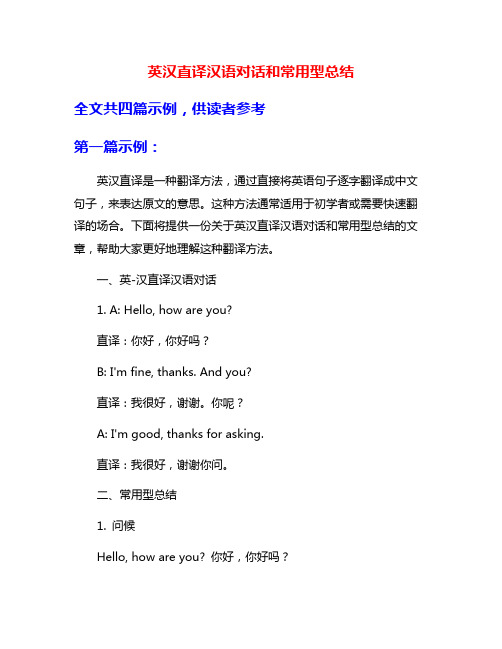
英汉直译汉语对话和常用型总结全文共四篇示例,供读者参考第一篇示例:英汉直译是一种翻译方法,通过直接将英语句子逐字翻译成中文句子,来表达原文的意思。
这种方法通常适用于初学者或需要快速翻译的场合。
下面将提供一份关于英汉直译汉语对话和常用型总结的文章,帮助大家更好地理解这种翻译方法。
一、英-汉直译汉语对话1. A: Hello, how are you?直译:你好,你好吗?B: I'm fine, thanks. And you?直译:我很好,谢谢。
你呢?A: I'm good, thanks for asking.直译:我很好,谢谢你问。
二、常用型总结1. 问候Hello, how are you? 你好,你好吗?I'm fine, thanks. And you? 我很好,谢谢。
你呢?2. 询问喜好What's your favorite color? 你喜欢什么颜色?My favorite color is blue. 我喜欢蓝色。
3. 询问来自Where are you from? 你来自哪里?I'm from China. 我来自中国。
4. 职业What do you do for a living? 你是做什么工作的?I'm a teacher. 我是个老师。
5. 语言能力Can you speak any other languages? 你会说其他语言吗?Yes, I can speak French and Spanish. 是的,我会说法语和西班牙语。
通过以上的例句和总结,我们可以看到英汉直译的特点是直接将英语句子逐字翻译成中文句子,虽然有时候不太符合汉语的表达习惯,但可以帮助初学者更快地理解英语句子的意思。
希望大家能够通过这种方法提高自己的英语水平,更好地与外国人交流。
第二篇示例:英汉直译是指将英文对话逐字直译成中文,这种翻译方式可能会导致表达不够自然或者不太符合中文习惯。
日常英语交流口语100句中文翻译
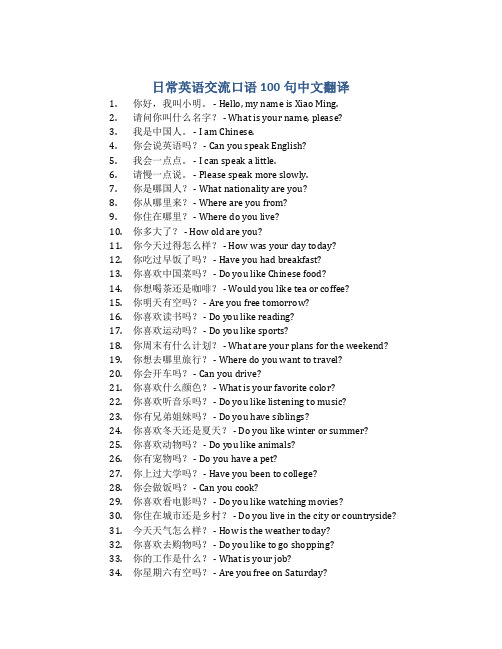
日常英语交流口语100句中文翻译1.你好,我叫小明。
- Hello, my name is Xiao Ming.2.请问你叫什么名字? - What is your name, please?3.我是中国人。
- I am Chinese.4.你会说英语吗? - Can you speak English?5.我会一点点。
- I can speak a little.6.请慢一点说。
- Please speak more slowly.7.你是哪国人? - What nationality are you?8.你从哪里来? - Where are you from?9.你住在哪里? - Where do you live?10.你多大了? - How old are you?11.你今天过得怎么样? - How was your day today?12.你吃过早饭了吗? - Have you had breakfast?13.你喜欢中国菜吗? - Do you like Chinese food?14.你想喝茶还是咖啡? - Would you like tea or coffee?15.你明天有空吗? - Are you free tomorrow?16.你喜欢读书吗? - Do you like reading?17.你喜欢运动吗? - Do you like sports?18.你周末有什么计划? - What are your plans for the weekend?19.你想去哪里旅行? - Where do you want to travel?20.你会开车吗? - Can you drive?21.你喜欢什么颜色? - What is your favorite color?22.你喜欢听音乐吗? - Do you like listening to music?23.你有兄弟姐妹吗? - Do you have siblings?24.你喜欢冬天还是夏天? - Do you like winter or summer?25.你喜欢动物吗? - Do you like animals?26.你有宠物吗? - Do you have a pet?27.你上过大学吗? - Have you been to college?28.你会做饭吗? - Can you cook?29.你喜欢看电影吗? - Do you like watching movies?30.你住在城市还是乡村? - Do you live in the city or countryside?31.今天天气怎么样? - How is the weather today?32.你喜欢去购物吗? - Do you like to go shopping?33.你的工作是什么? - What is your job?34.你星期六有空吗? - Are you free on Saturday?35.你喜欢喝啤酒吗? - Do you like to drink beer?36.你喜欢喝茶呢还是咖啡? - Do you prefer tea or coffee?37.你爱吃巧克力吗? - Do you love to eat chocolate?38.你今天心情怎么样? - How are you feeling today?39.你的朋友喜欢运动吗? - Do your friends like sports?40.你想去旅行吗? - Do you want to travel?41.你喜欢看书吗? - Do you like reading books?42.你今晚过得如何? - How was your evening?43.你喜欢喝咖啡吗? - Do you like to drink coffee?44.你明天有什么计划? - What are your plans for tomorrow?45.你想去看电影吗? - Do you want to go watch a movie?46.你会游泳吗? - Can you swim?47.你喜欢吃西餐还是中餐? - Do you prefer Western or Chinese food?48.你家有几口人? - How many people are in your family?49.你的生日是几月几日? - What is your birthday?50.你会弹吉他吗? - Can you play the guitar?51.你星期天有空吗? - Are you free on Sunday?52.你喜欢去海边吗? - Do you like to go to the beach?53.你喜欢喝果汁吗? - Do you like to drink juice?54.你的假期计划是什么? - What are your holiday plans?55.你喜欢看足球比赛吗? - Do you like watching football matches?56.你会滑雪吗? - Can you ski?57.你上班要坐公交车吗? - Do you take a bus to work?58.你愿意跟我一起去看电影吗? - Would you like to go watch a movie with me?59.你想喝茶还是咖啡? - Would you like tea or coffee?60.你周末喜欢做什么? - What do you like to do on weekends?61.你刚才在干什么? - What were you doing just now?62.你喜欢在家还是外面吃饭? - Do you like to eat at home or outside?63.你今天有什么计划? - What are your plans for today?64.你工作很忙吗? - Are you busy with your work?65.你愿意和我一起去跑步吗? - Would you like to go running with me?66.你在这里工作多久了? - How long have you been working here?67.你星期一有空吗? - Are you free on Monday?68.你星期三有什么安排? - What are your plans for Wednesday?69.你住在哪个城市? - In which city do you live?70.你想喝热巧克力还是冰巧克力? - Do you want hot chocolate or iced chocolate?71.你喜欢去野餐吗? - Do you like to go for a picnic?72.你今天打算做什么? - What do you plan to do today?73.你多长时间回家一次? - How often do you go home?74.你愿意和我一起参加派对吗? - Would you like to join the party with me?75.你的家乡是一个大城市吗? - Is your hometown a big city?76.你住在城市中心还是郊区? - Do you live in the city center or suburbs?77.你们家有车吗? - Does your family have a car?78.你想买一件什么衣服? - What kind of clothes do you want to buy?79.你希望更多时间陪家人吗? - Do you wish for more time with family?80.你习惯早起吗? - Are you used to getting up early?81.你的朋友喜欢喝酒吗? - Do your friends like to drink?82.你想出国留学吗? - Do you want to study abroad?83.你每天都做运动吗? - Do you exercise every day?84.你今天下午有什么计划? - What are your plans for this afternoon?85.你喜欢喝饮料还是牛奶? - Do you prefer drinks or milk?86.你的手机是哪个牌子的? - Which brand is your phone?87.你喜欢看电视剧吗? - Do you like to watch TV dramas?88.你会弹钢琴吗? - Can you play the piano?89.你妈妈是做什么工作的? - What does your mom do for work?90.你有兴趣学习新技能吗? - Are you interested in learning new skills?91.你想尝试一些新的餐馆吗? - Do you want to try some new restaurants?92.你最喜欢哪个季节? - Which season do you like the most?93.你愿意尝试一些新的运动吗? - Would you be willing to try some new sports?94.你的家乡是一个热闹的地方吗? - Is your hometown a lively place?95.你住在学校宿舍吗? - Do you live in a school dormitory?96.你通常在周末做什么? - What do you usually do on weekends?97.你帮家里做家务吗? - Do you help with household chores at home?98.你喜欢旅行还是呆在家里? - Do you like to travel or stay at home?99.你喜欢参加聚会吗? - Do you like to attend parties?100.你觉得现在怎么样? - How do you feel right now?以上是日常英语交流口语100句中文翻译,希望对你有所帮助。
中文最常用短语地道英文表达
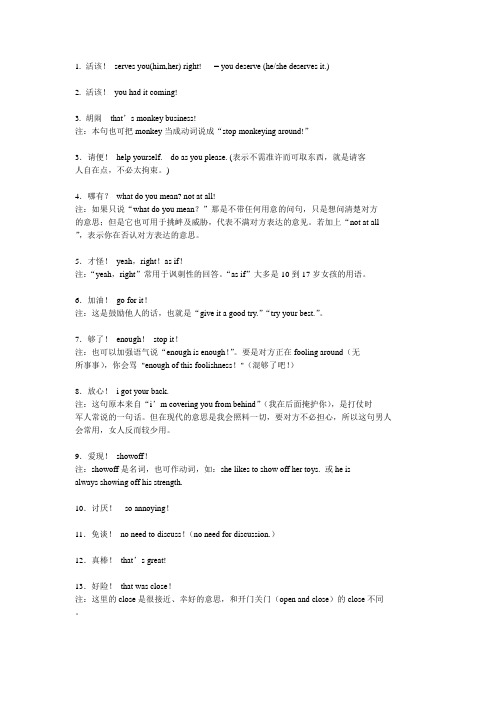
1. 活该!serves you(him,her) right! = you deserve (he/she deserves it.)2. 活该!you had it coming!3. 胡闹that’s monkey business!注:本句也可把monkey当成动词说成“stop monkeying around!”3.请便!help yourself. do as you please. (表示不需准许而可取东西,就是请客人自在点,不必太拘束。
)4.哪有?what do you mean? not at all!注:如果只说“what do you mean?”那是不带任何用意的问句,只是想问清楚对方的意思;但是它也可用于挑衅及威胁,代表不满对方表达的意见。
若加上“not at all ”,表示你在否认对方表达的意思。
5.才怪!yeah,right!as if!注:“yeah,right”常用于讽刺性的回答。
“as if”大多是10到17岁女孩的用语。
6.加油!go for it!注:这是鼓励他人的话,也就是“give it a good try.”“try your best.”。
7.够了!enough!stop it!注:也可以加强语气说“enough is enough!”。
要是对方正在fooling around(无所事事),你会骂"enough of this foolishness!"(混够了吧!)8.放心!i got your back.注:这句原本来自“i’m covering you from behind”(我在后面掩护你),是打仗时军人常说的一句话。
但在现代的意思是我会照料一切,要对方不必担心,所以这句男人会常用,女人反而较少用。
9.爱现!showoff!注:showoff是名词,也可作动词,如:she likes to show off her toys. 或he isalways showing off his strength.10.讨厌!so annoying!11.免谈!no need to discuss!(no need for discussion.)12.真棒!that’s great!13.好险!that was close!注:这里的close是很接近、幸好的意思,和开门关门(open and close)的close不同。
口语中的习惯用语让你的口语更地道
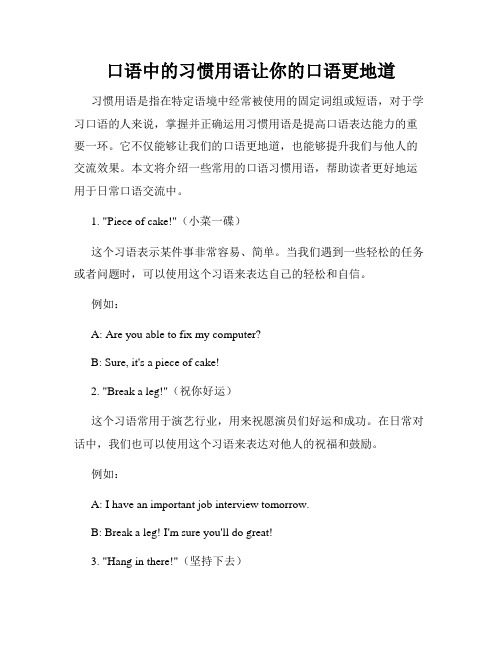
口语中的习惯用语让你的口语更地道习惯用语是指在特定语境中经常被使用的固定词组或短语,对于学习口语的人来说,掌握并正确运用习惯用语是提高口语表达能力的重要一环。
它不仅能够让我们的口语更地道,也能够提升我们与他人的交流效果。
本文将介绍一些常用的口语习惯用语,帮助读者更好地运用于日常口语交流中。
1. "Piece of cake!"(小菜一碟)这个习语表示某件事非常容易、简单。
当我们遇到一些轻松的任务或者问题时,可以使用这个习语来表达自己的轻松和自信。
例如:A: Are you able to fix my computer?B: Sure, it's a piece of cake!2. "Break a leg!"(祝你好运)这个习语常用于演艺行业,用来祝愿演员们好运和成功。
在日常对话中,我们也可以使用这个习语来表达对他人的祝福和鼓励。
例如:A: I have an important job interview tomorrow.B: Break a leg! I'm sure you'll do great!3. "Hang in there!"(坚持下去)这个习语表示对某人持续努力或面临困难时的鼓励和支持。
当某人遇到困难或者挫折时,我们可以使用这个习语来表达对他们的支持和鼓励。
例如:A: I'm really tired of studying. I want to give up.B: Hang in there! You're almost done. Don't give up now!4. "No pain, no gain."(不经历风雨,怎能见彩虹)这个习语表示在追求目标或取得成功的过程中,通常需要经历艰辛和困难。
它鼓励人们要坚持努力,不畏艰难,相信只有经历了困难才能收获成功。
常见的中文词汇英译版及翻译
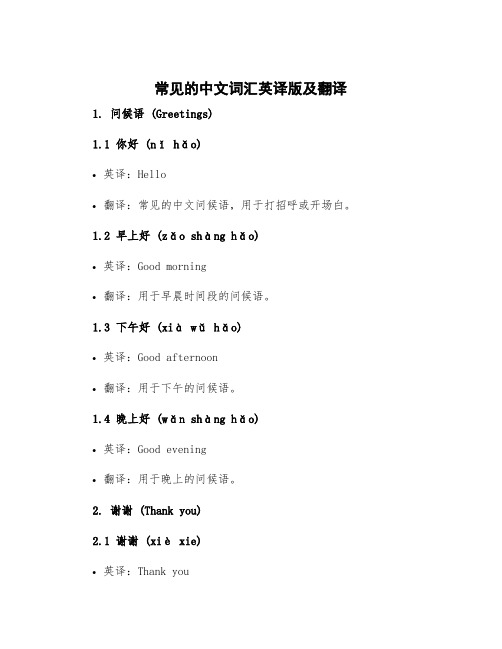
常见的中文词汇英译版及翻译1. 问候语 (Greetings)1.1 你好(nǐ hǎo)•英译:Hello•翻译:常见的中文问候语,用于打招呼或开场白。
1.2 早上好(zǎo shàng hǎo)•英译:Good morning•翻译:用于早晨时间段的问候语。
1.3 下午好(xià wǔ hǎo)•英译:Good afternoon•翻译:用于下午的问候语。
1.4 晚上好(wǎn shàng hǎo)•英译:Good evening•翻译:用于晚上的问候语。
2. 谢谢 (Thank you)2.1 谢谢(xiè xie)•英译:Thank you•翻译:表达对他人的感激之情,用于接受礼物、帮助等情况下。
2.2 非常感谢(fēi cháng gǎn xiè)•英译:Thank you very much•翻译:表示非常感激,程度更强烈。
2.3 不用谢(bù yòng xiè)•英译:You’re welcome•翻译:用于回答对方的感谢,表示不需要对方客气。
3. 问候 (Asking about well-being)3.1 你好吗?(nǐ hǎo ma)•英译:How are you?•翻译:用于问候对方的身体或心情状况。
3.2 最近怎么样?(zuì jìn zěn me yàng)•英译:How have you been?•翻译:用于询问对方近期的生活状况,一般带有关心的语气。
3.3 好久不见!(hǎo jiǔ bú jiàn)•英译:Long time no see!•翻译:用于长时间未见面后的问候语,表达对再次见到对方的高兴之情。
4. 口头禅 (Phrases)4.1 对不起(duì bù qǐ)•英译:Sorry•翻译:用于表示道歉或请求原谅。
常见中文俗语英译技巧

常见中文俗语英译技巧许多中国人爱用俗语、成语、俚语。
由于中美两国文化、风俗、思想、习惯的差异,如果照字直译,或把单字「堆在一起」,老外听了,也许就会「满头雾水」、「迷迷糊糊」,成了他们所说的「只有你们中国人听得懂」的「中国英文」(Chinese English)。
在此,把一些常见的中文俗语与一般老外的说法相对比较,或许可供有兴趣的读者参考。
1. 人山人海:有人直译为:People mountain people sea.这就是「中国英文」,老外很难理解。
他们指「人多」时,通常只说:「There is a large crowd of people.」如果看到电影院门前大排长龙,也只说:「There is (was) a long movie line.」不过在诗词用语(poetic expression) 里,老外也有使用:「a (the) sea of faces」,颇有咱们「人山人海」的味道。
例如:Looking out upon the sea of faces, Mr. A delivered a touching speech.(望着一片人山人海的听众,A先生发表一篇动人的演说。
)Standing at his podium, President Clinton saw a sea of faces waving at him.(柯林顿总统站在讲台上看到人山人海的人群挥手向他致意。
)可见,说话者通常要在台上或高处,才有「人海」的感觉。
因此,可以说:I saw a sea of faces from the top of the building. 但在平地的人群中,就不说:「I saw the sea of faces.」也不说:「There is a sea of faces.」只说:「I saw a large crowd of people.」2. 家家有本难念的经:有人译成:Every family cooking -pot has a black spot. (意思是:每个家庭的锅子都有黑色的污点)这样说法,老外恐怕不能充分了解。
中文口语英语
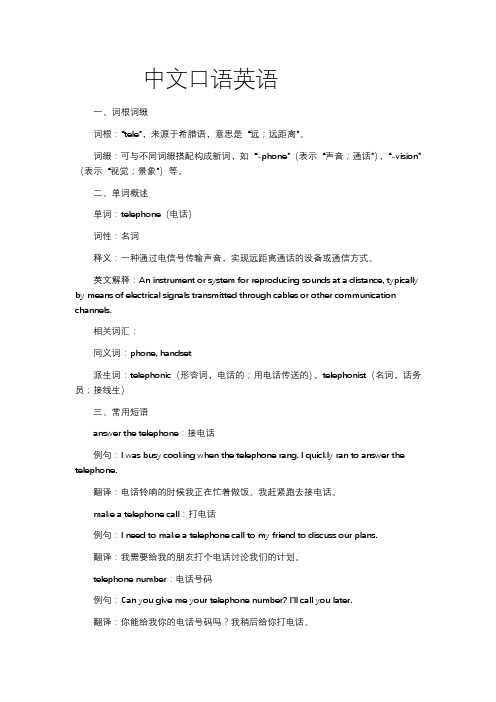
中文口语英语一、词根词缀词根:“tele”,来源于希腊语,意思是“远;远距离”。
词缀:可与不同词缀搭配构成新词,如“-phone”(表示“声音;通话”),“-vision”(表示“视觉;景象”)等。
二、单词概述单词:telephone(电话)词性:名词释义:一种通过电信号传输声音,实现远距离通话的设备或通信方式。
英文解释:An instrument or system for reproducing sounds at a distance, typically by means of electrical signals transmitted through cables or other communication channels.相关词汇:同义词:phone, handset派生词:telephonic(形容词,电话的;用电话传送的),telephonist(名词,话务员;接线生)三、常用短语answer the telephone:接电话例句:I was busy cooking when the telephone rang. I quickly ran to answer the telephone.翻译:电话铃响的时候我正在忙着做饭。
我赶紧跑去接电话。
make a telephone call:打电话例句:I need to make a telephone call to my friend to discuss our plans.翻译:我需要给我的朋友打个电话讨论我们的计划。
telephone number:电话号码例句:Can you give me your telephone number? I'll call you later.翻译:你能给我你的电话号码吗?我稍后给你打电话。
四、用法作为名词,可作主语、宾语等。
例如:The telephone on my desk is ringing.(作主语)我桌上的电话在响。
英语中产生歧义的翻译以及地道的口语翻译

英语中产生歧义的翻译以及地道的口语翻译sporting house 妓院(不是“体育室”)dead president 美钞(上印有总统头像)(并非“死了的总统”)lover 情人(不是“爱人”)busboy 餐馆勤杂工(不是“公汽售票员”)busybody 爱管闲事的人(不是“大忙人”)dry goods (美)纺织品;(英)谷物(不是“干货”)heartman 换心人(不是“有心人”)mad doctor 精神病科医生(不是“发疯的医生”)eleventh hour 最后时刻(不是“十一点”)blind date (由第三者安排的)男女初次会面(并非“盲目约会”或“瞎约会”)personal remark 人身攻击(不是“个人评论”)sweet water 淡水(不是“糖水”或“甜水”)confidence man 骗子(不是“信得过的人”)criminal lawyer 刑事律师(不是“犯罪的律师”)service station 加油站(不是“服务站”)rest room 厕所(不是“休息室”)dressing room 化妆室(不是“试衣室”或“更衣室”)horse sense 常识(不是“马的感觉”)capital idea 好主意(不是“资本主义思想”)familiar talk 庸俗的交谈(不是“熟悉的谈话”)black tea 红茶(不是“黑茶”)black art 妖术(不是“黑色艺术”)black stranger 完全陌生的人(不是“陌生的黑人”)white coal (作动力来源用的)水(不是“白煤”)white man 忠实可靠的人(不是“皮肤白的人”)yellow book 黄皮书(法国政府报告书,以黄纸为封)(不是“黄色书籍”)red tape 官僚习气(不是“红色带子”)green hand 新手(不是“绿手”)blue stocking 女学者、女才子(不是“蓝色长统袜”)China policy 对华政策(不是“中国政策”)Chinese dragon 麒麟(不是“中国龙”)American beauty 一种玫瑰,名为“美国丽人”(不是“美国美女”)English disease 软骨病(不是“英国病”)Indian summer 愉快宁静的晚年(不是“印度的夏日”)Greek gift 害人的礼品(不是“希腊礼物”)Spanish athlete 吹牛的人(不是“西班牙运动员”)French chalk 滑石粉(不是“法国粉笔”)2.习语类pull one's leg 开玩笑(不是“拉后腿”)in one's birthday suit 赤身裸体(不是“穿着生日礼服”)eat one's words 收回前言(不是“食言”)an apple of love 西红柿(不是“爱情之果”)handwriting on the wall 不祥之兆(不是“大字报”)bring down the house 博得全场喝彩(不是“推倒房子”)have a fit 勃然大怒(不是“试穿”)make one's hair stand on end 令人毛骨悚然—恐惧(不是“令人发指——气愤”)be taken in 受骗,上当(不是“被接纳”)think a great deal of oneself 高看或看重自己(不是“为自己想得很多”)pull up one's socks 鼓起勇气(不是“提上袜子”)have the heart to do (用于否定句)忍心做……不是“有心做”或“有意做”)3.短句类What a shame! 多可惜!真遗憾!(不是“多可耻”)You don't say! 是吗!(不是“你别说”)You can say that again! 说得好!(不是“你可以再说一遍”)I haven't slept better. 我睡得好极了。
- 1、下载文档前请自行甄别文档内容的完整性,平台不提供额外的编辑、内容补充、找答案等附加服务。
- 2、"仅部分预览"的文档,不可在线预览部分如存在完整性等问题,可反馈申请退款(可完整预览的文档不适用该条件!)。
- 3、如文档侵犯您的权益,请联系客服反馈,我们会尽快为您处理(人工客服工作时间:9:00-18:30)。
中文常用口语地道翻译解析(翻译公司:提供):
1、这山望着那山高 The grass is always greener on the other hill.
人都是这山望着那山高,对自己的状况没有满意的时候。
Almost all people see that the grass is greener on the other hill. They never feel satisfied with what they've already got。
2、上瘾get into one's blood
说来也怪,很多不好的事往往会使人上瘾。
It's astoundingly funny that many harmful things usually get into our blood。
3、发牢骚 beef
他坐在那里什么事也不干,总是发牢骚,真烦死人。
I'm really bored stiff with his sitting there doing nothing but beefing。
4、等不及了 champ at the bit
咱们快点吧,孩子们都等不及了。
Let's shake the leg. The kids are champing at the bit。
5、点头哈腰bow and scrape
从她在老板前点头哈腰地那个模样,你就知道她是个什么人了。
From the way she's bowing and scraping in front of the boss, you'll know what sort of person she is。
6、疯疯癫癫go gaga
对他的话不要太在意了,他总是疯疯癫癫的。
Don't take what he says so seriously. He's always going gaga。
7、说话不算数go back on one's words
他那个人说话从不算数,我们可不能依靠他。
We cannot account on him. He always goes back on his words。
8、废话连篇beat one's gums
谁喜欢坐在那里听你的废话连篇?
Who would enjoy sitting there listening to your beating your gums?
9、恩将仇报 bite the hand that feeds one
你难道不知道她是个恩将仇报的人?
Don't you know she's the one that would bite the hand that feeds her?
10、不忍心not have the heart to do
如果我是你,我可不忍心把孩子们就在家里没人照看
If I were you, I wouldn't have the heart tot leave the kids at home uncared for。
11、勤快an eager beaver
他特别勤快,从来没有闲着的时候。
He's an eager beaver, never staying idle。
